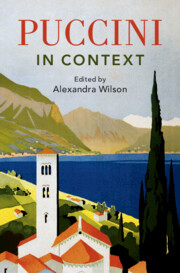Book contents
- Puccini in Context
- Composers in Context
- Puccini in Context
- Copyright page
- Contents
- Figures
- Table
- Notes on Contributors
- Preface
- Part I Formative Influences
- Part II Puccini’s Places
- Part III Influences and Interests
- Part IV Bringing Puccini to the Stage
- Part V Image and Reputation
- Part VI Puccini through a Political Lens
- Chapter 22 Puccini and Religion
- Chapter 23 Puccini and Politics
- Chapter 24 Gender Politics in Puccini’s Operas
- Chapter 25 The Racial Politics ofMadama ButterflyandTurandot
- Part VII Interpreting Puccini
- Part VIII Legacy
- Bibliography
- Index
Chapter 22 - Puccini and Religion
from Part VI - Puccini through a Political Lens
Published online by Cambridge University Press: 31 August 2023
- Puccini in Context
- Composers in Context
- Puccini in Context
- Copyright page
- Contents
- Figures
- Table
- Notes on Contributors
- Preface
- Part I Formative Influences
- Part II Puccini’s Places
- Part III Influences and Interests
- Part IV Bringing Puccini to the Stage
- Part V Image and Reputation
- Part VI Puccini through a Political Lens
- Chapter 22 Puccini and Religion
- Chapter 23 Puccini and Politics
- Chapter 24 Gender Politics in Puccini’s Operas
- Chapter 25 The Racial Politics ofMadama ButterflyandTurandot
- Part VII Interpreting Puccini
- Part VIII Legacy
- Bibliography
- Index
Summary
This chapter considers the treatment of religion in Puccini’s operas, with a strong focus on the two works with particular ecclesiastical themes, Tosca and Suor Angelica. It shows how Puccini drew upon the example of earlier models of religious representation in opera, by composers including Boito and Verdi. It considers the changing relationship between the Church and the state during Puccini’s lifetime, and the ongoing (though evolving) role of censorship laws. The use of liturgical scenes by Puccini and his contemporaries within the giovane scuola is discussed, with close analysis of stock techniques that are employed. The author concludes that Puccini’s works are made particularly effective by their habit of contrasting the secular and the sacred, using a more nuanced characterisation than is found in the works of his contemporaries.
- Type
- Chapter
- Information
- Puccini in Context , pp. 181 - 188Publisher: Cambridge University PressPrint publication year: 2023

